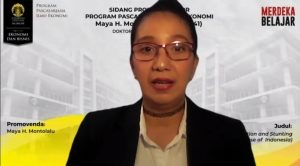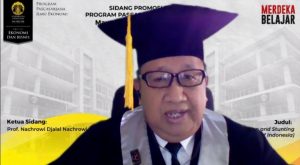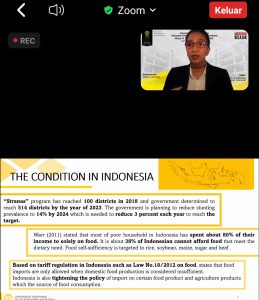PPIE FEB UI Doctoral Promotion Researches Food Trade Liberalization and Stunting Prevalence in the Case of Indonesia
Nino Eka Putra ~ Public Relations FEB UI
DEPOK – (26/7/2022) The Postgraduate Program in Economics (PPIE), Faculty of Economics and Business, Universitas Indonesia, held an open session of Maya Hendrietta Montolalu’s Doctoral Promotion online on Tuesday (26/7).
The Doctoral Promotion Session was chaired by Prof. Nachrowi Djalal Nachrowi, Ph.D., with supervisors Dr. Mahjus Ekananda (Promoter), Teguh Dartanto, Ph.D. (Co-Promoter 1), Diah Widyawati, Ph.D. (Co-Promoter 2). The examiners were Dr. Hera Susanti (Chief Examiner), Diahhadi Setyonaluri, Ph.D., Kiki Verico, Ph.D., Dr. Widyono Soetjipto, and Wahyu Prasetyawan, Ph.D..
In this open session, Promovenda Maya Hendrietta Montolalu successfully defended her dissertation entitled “Food Trade Liberalization and Stunting Prevalence the Case of Indonesia.”

Promovenda Maya Hendrietta Montolalu conducted research by reviewing the debate on the effect of trade liberalization on food security, raising solid arguments for and against the issue. This research aims to analyze the link between trade liberalization (measured by food import tariff exposure) and food security (measured by nutritional intake) in the case of Indonesia.
The study decomposes national food import tariffs into district-level import tariff exposures and analyzes them by sectoral tariffs such as agricultural and food manufacturing import tariffs. The analysis uses panel data from 495 districts in Indonesia and postulates the relationship between trade and food security using fixed effects regression.
By analyzing the effect of tariff exposure on food consumption across all districts, contributing to the literature on trade liberalization and food security, it is found that exposure to import tariffs negatively affects nutrient intake, and each sector exerts different effects on nutrient intake. Furthermore, the impact of manufacturing tariffs on calorie and protein intake is slightly higher than agricultural tariffs. Furthermore, the effect of import tariffs on both sectors varies across islands in Indonesia.
Empirically, there are still inconclusive arguments about the effect of trade liberalization on health, especially child stunting. Theoretically, trade liberalization measured by import tariffs can affect food security regarding nutritional intake, which is highly correlated with child stunting.
Meanwhile, this study also aims to analyze the impact of trade liberalization on child stunting in Indonesia. The study uses panel instrumental variable regression on combined district-level data from the National Basic Health Research (Riskesdas), the National Household Socioeconomic Survey (Susenas), and the UNCTAD KA for import tariffs.
As import tariffs are at the national level, the study separated import tariffs to the district level and decomposed them into agriculture and food manufacturing sectors. The study confirmed that while trade indirectly affects child stunting, sectoral tariffs have a distinct effect on child stunting that can be seen through their impact on nutrient intake. The study concludes that protectionist policies in international trade hurt child stunting.
The Board of Directors of the open doctoral promotion session decided that Maya Hendrietta Montolalu passed with a Very Satisfactory predicate and won the 130th Doctoral Degree in Economics. Congratulations to Dr. Maya Hendrietta Montolalu!





